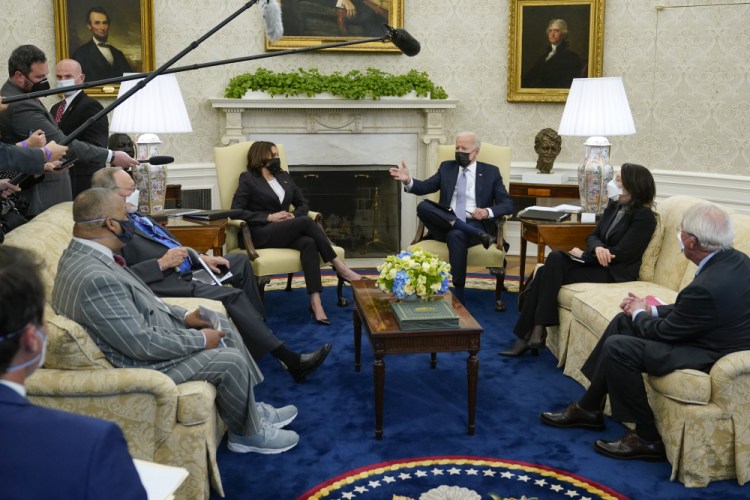WASHINGTON — President Biden wants Congress to know he’s sincere about cutting a deal on infrastructure, but the White House is also highlighting needed repairs and upgrades state-by-state that cost far more than what Republicans are willing to spend.
Biden met Monday afternoon with a bipartisan group of lawmakers and tried to assure them that the Oval Office gathering was not “window dressing.” One of the core disputes is what counts as infrastructure in his $2.3 trillion proposal that would also raise corporate taxes.
“I’m prepared to negotiate as to the extent of my infrastructure project, as well as how we pay for it,” Biden said. “It’s going to get down to what we call ‘infrastructure.’”
The meeting came as the White House released state-by-state breakdowns Monday that show the dire shape of roads, bridges, the power grid and housing affordability, among other issues. Biden’s team is making a direct argument for lawmakers to put their constituents ahead of their ideologies. An appeal to the broader public is unlikely to resonate much with Republican lawmakers who have already blasted the plan.
The figures in the state summaries paint a decidedly bleak outlook for the world’s largest economy after years of repairs being deferred and delayed. They suggest that too much infrastructure is unsafe for vehicles at any speed, while highlighting the costs of extreme weather events that have become more frequent with climate change as well as dead spots for broadband and a dearth of child care options.
Among the four Republicans on the White House guest list Monday were Sen. Roger Wicker of Mississippi, Sen. Deb Fischer of Nebraska and Reps. Garret Graves of Louisiana and Don Young of Alaska. Democrats on the list were Sens. Maria Cantwell of Washington and Alex Padilla of California and Reps. Donald Payne Jr. of New Jersey and David Price of North Carolina.
Drawn from an array of private and public data, the state reports show there are 7,300 miles of highway in Michigan alone that are in poor condition. Iowa has 4,571 bridges in need of repair. There is a roughly 4-in-10 chance that a public transit vehicle in Indiana might be ready for the scrap yard. Pennsylvania’s schools are short $1.4 billion for maintenance and upgrades.
In Maine, which was given a C-, there’s 315 bridges and more than 1,438 miles of highway in poor condition. Since 2011, commute times have increased by 1.9 percent and on average, each driver pays $543 per year in costs due to driving on roads in need of repair. The state was also graded on housing: 68,000 renters in Maine are rent burdened, meaning they spend more than 30 percent of their income on rent.
Most states received a letter grade on their infrastructure. West Virginia earned a D. So did Biden’s home state of Delaware. Of the states rated, the highest grade went to Georgia and Utah, which each notched a C-plus. The lowest grade, D-minus, went to the territory of Puerto Rico.
The administration is banking that the data will confirm the everyday experiences of Americans as they bump over potholes, get trapped in traffic jams and wait for buses that almost never correspond to published schedules. There is already a receptive audience to the sales pitch, and the strategy is that public support can overcome any congressional misgivings.
“We don’t have a lot of work to do to persuade the American people that U.S. infrastructure needs major improvement,” Transportation Secretary Pete Buttigieg said on Fox News Channel’s “Fox News Sunday” ahead of the reports’ release. “The American people already know it.”
Republican lawmakers have been quick to reject the infrastructure proposal from Biden. They say just a fraction of the spending goes to traditional infrastructure, as $400 billion would expand Medicaid support for caregivers and substantial portions would fund electric vehicle charging stations and address the racial injustice of highways that were built in ways that destroyed Black neighborhoods.
The reports give some data to back up their argument that more money should be spent on roads and bridges. Biden’s plan would modernize 20,000 miles worth of roadways, but California by itself has 14,220 miles of highway in poor condition.
Republican lawmakers also object to funding the package by increasing the corporate tax rate from 21 percent to 28 percent and increasing the global minimum tax, among other tax changes including stepped-up IRS enforcement being proposed by the Biden administration.
“This is a massive social welfare spending program combined with a massive tax increase on small-business job creators,” Wicker said on ABC’s “This Week” on Sunday. “I can’t think of a worse thing to do.”
Yet the state-by-state reports make clear that many of the people Wicker represents could benefit from the package, an aspect of the Biden effort to engender the backing of voters across party lines.
Mississippi needs $4.8 billion for drinking water and $289 million for schools. Nearly a quarter of households lack an internet subscription, and a similar percentage lives in areas without broadband. Mississippians who use public transportation have to devote an extra 87.7 percent of their time to commuting.
Mississippi’s infrastructure received a grade of D-plus.
Copy the Story LinkComments are not available on this story.
Send questions/comments to the editors.


